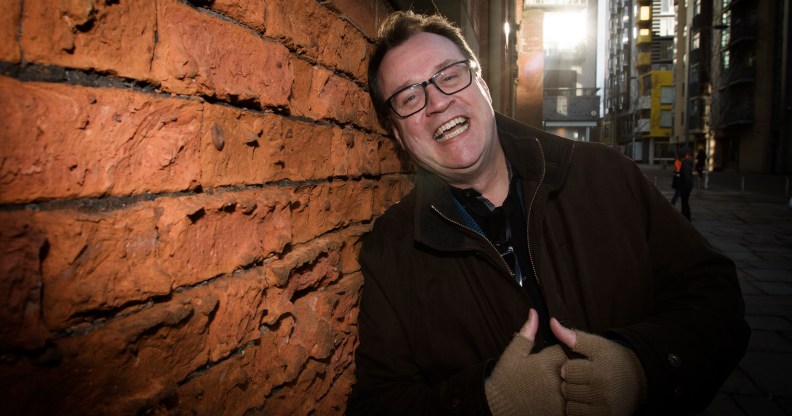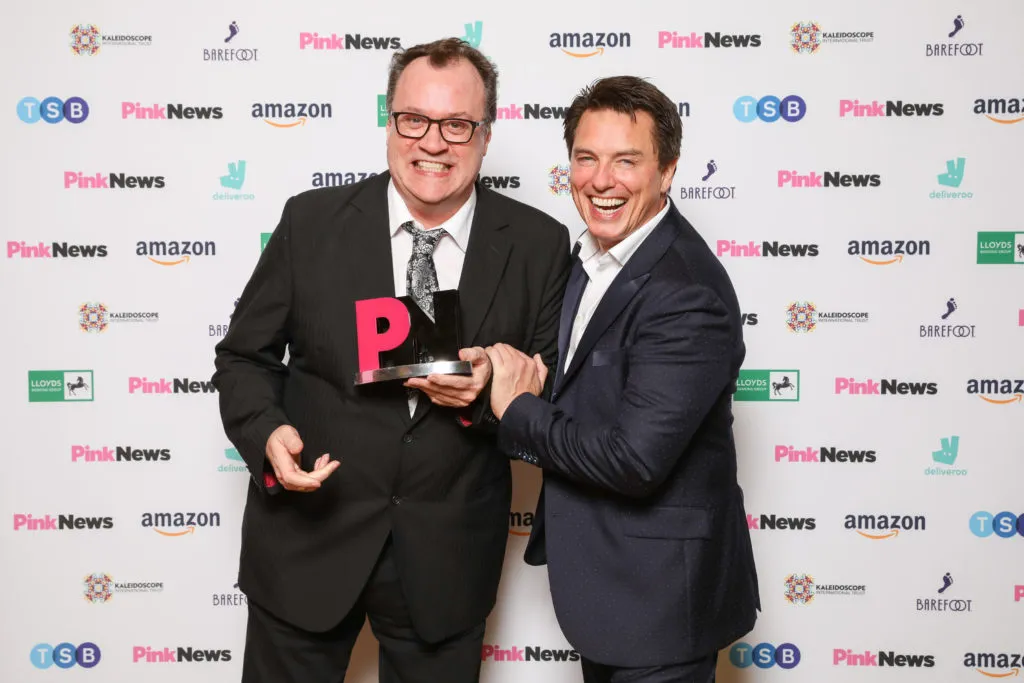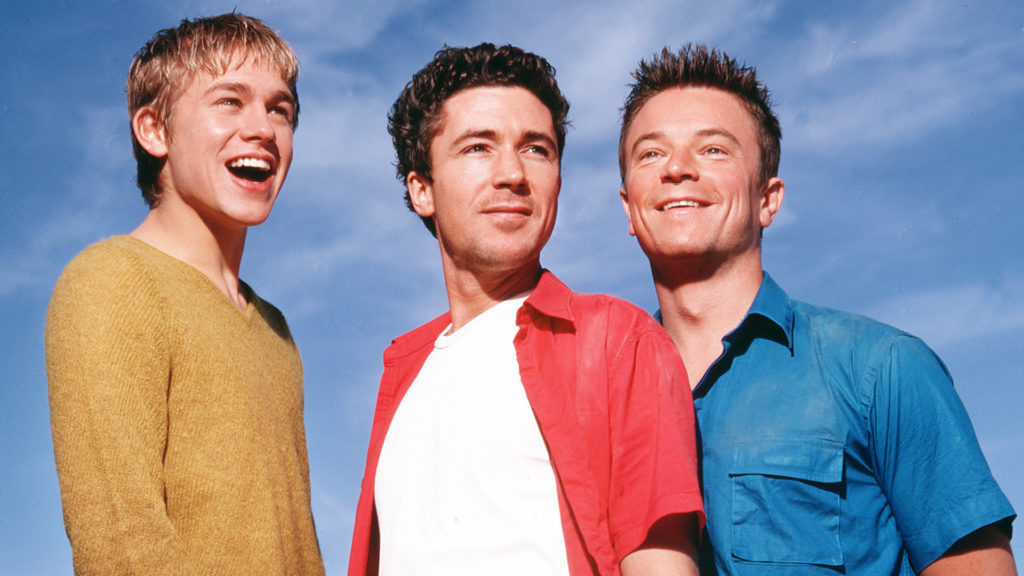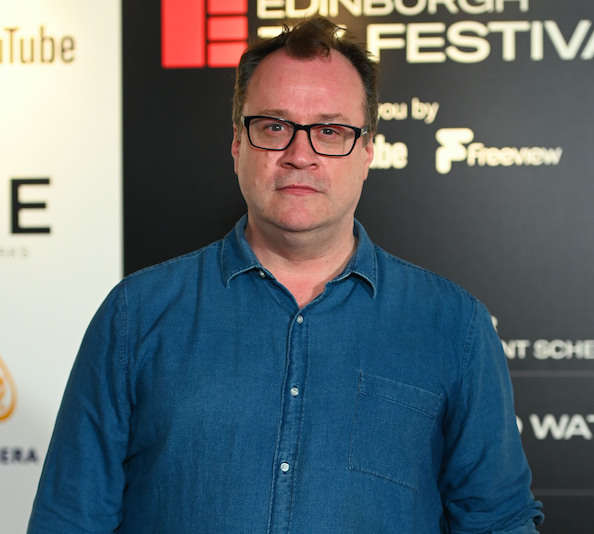Russell T Davies on queer representation on TV, time loop anomalies and homophobic folk dancers. Yes, really

British television screenwriter and director Russell T Davies. (Colin McPherson/Corbis/ Getty)
Russell T Davies is the kind of man who is so genuinely warm and friendly that you’ll want to invite him to your wedding moments after meeting him.
Which is exactly what I did. The only problem is, I’m not getting married.
This humble Whovian reporter spoke to Davies ahead of the 2019 PinkNews Awards, where he was presented with a lifetime achievement award. The openly gay TV showrunner has made it his life’s work to portray a diverse range of characters on screen, telling their stories with honesty and compassion.
Among them is the unforgettable Captain Jack Harkness – Doctor Who‘s first-ever openly LGBT+ character, and an immortal omnisexual alien space pirate, no less.
Played by John Barrowman, Captain Jack was everything that typical LGBT+ characters hadn’t been in the past: handsome, charming, masculine, an archetypal action hero – the type of character Davies himself had longed to see as a child.
“It would’ve meant a lot to see that, I was thirsty for that kind of material,” he said.
And the audiences were too, it turned out. Captain Jack proved so popular that he became the star of a Doctor Who spin-off, Torchwood, the following year. But not everyone could handle the concept of a non-straight character on a children’s show.
Davies recalled a time when a homophobe at a wedding confronted him for allowing Captain Jack to kiss the Doctor. “I literally verbally attacked her until I drove her out of the wedding,” he admitted.
“I wasn’t going to stand for it. I wasn’t going to stand there and apologise, I wasn’t going to listen to her rubbish. I literally told her that her children should be taken into care because she was an unfit mother. And she left! She left the wedding!”
In this moment I was briefly overwhelmed by that rare and wonderful sense of validation you get when your hero is exactly the person you’d always hoped him to be.
“Come to my wedding!” I gushed before I could stop myself.
“Sure! When is it?” he immediately replied, because he’s Russell T Davies, the nicest man in the world.
I spluttered for a bit as I tried to figure out what to say next, ending up with something that sounded like, “Soon! Very soon!”

Russell T Davies and John Barrowman at the 2019 PinkNews Awards
Davies’ vehemence to casual homophobia may seem at odds with his affable nature, but it’s no surprise when you consider the barriers he had to break down to get to where he is now.
He’s famed for his depictions of LGBT+ people, whose lives and loves he boldly pushed into British homes at a time when homosexuality was still commonly associated with perversion.
Davies’ trailblazing series about Manchester’s gay scene, Queer as Folk, has now gained a cult following, but when it was first televised 20 years ago the backlash was fierce.
It was 1999: the UK was in the wake of the HIV/AIDS crisis, equal age of consent had been repeatedly blocked in parliament, and the homophobic Section 28 legislation was in force in schools across the country.
“We had complaints everywhere,” Davies remembered.
“We had complaints from straight people. We had complaints from gay people. But do you know who we had complaints from? Folk dancers. ‘Dear sir, Don’t associate my hobby with rimming and paedophilia.’ Frankly, it’s a fine line between that and the tarantella. Not that much of difference!”
Despite the struggles he faced, he says that he wouldn’t have preferred to write in a more tolerant era if he had the choice.
“If I could’ve started writing 20 years earlier, in the 60s and 70s, that would have been glorious,” he said. “But certainly not later, no, I enjoyed being the first with Queer as Folk.
“I loved knocking down the walls, I loved challenging the press, I loved the fight we had to make! It was great fun. I wouldn’t have missed it for the world.”

Charlie Hunman, Aidan Gillen and Craig Kelly in Queer as Folk. (Channel 4)
The unlikely heroes of this time, he says, turned out to be the daily soap operas.
“We call it the dark days now but there were shafts of light everywhere; [TV] wasn’t totally devoid of gay material. Back in the 90s and 2000s, soap operas were really setting the tone of the entire national conversation,” he explained.
He nodded to BBC’s Eastenders which introduced its first gay character, Colin Russell, in 1986. Colin would be one of the show’s most controversial characters ever, and his first kiss – the first same-sex kiss on any UK soap – made national headlines.
“It’s hard to get across how sensational that was at the time, and that went well into the 2000s,” Davies said.
“[The soaps] were real trailblazers but they never get credit for what they do. They were always taken for granted because they are always there, five times a week, but they were massively influential.”
He modestly credits their great leaps for giving him the freedom to bring LGBT+ characters to Doctor Who when he took the helm in 2005.
“By then it was easy getting Captain Jack on screen, easy,” he said. “If I am in the room with you, you’re not going to challenge my gay character. You’re not going to say to me, ‘No, this character cannot be gay.’
“Commissioners who work in drama, they didn’t even blink. There was never a conversation about whether it was a good or bad thing for a children’s show, it was just assumed by good, right-thinking people that it was fine.”
Yet this came only six years after Queer as Folk‘s debut, showing just how quickly public opinion had shifted – or perhaps how well respected Davies’ work had now become.

Russell T Davies at the Edinburgh TV Festival on August 21, 2019 (Ken Jack/Getty)
Today, LGBT+ people are better represented than ever before in the entertainment industry. Gen Z children will grow up with a diverse range of role models across the whole LGBT+ spectrum, from Lady Gaga, Laverne Cox and RuPaul to Billy Porter, Ellen DeGeneres and Halsey.
It’s thanks in no small part to the Russells of the world, who were unafraid to be ‘first’ when it wasn’t easy or respected.
His rich, authentic characters gave hope to closeted young people across the country, who were finally beginning to see images of themselves represented on screen.
“The defiance of Queer as Folk was liberating,” said gay journalist Owen Jones, describing the show as “a joyful revelation for LGBT viewers like me”.
What would Davies say to his closeted ten-year-old self if he met him today?
“I think I’d just say, ‘Don’t worry, it’s all going to be alright!'” he laughed, before quickly changing his answer to one befitting a true sci-fi writer.
“If I saw little Russell walking by I’d probably keep quiet, because if I ever told him he was going to be running Doctor Who one day his little head would explode and I’d cause a time loop anomaly because I’d be dead and the whole universe would vanish in that loop, so I’d probably just give him a pat on the head and walk on.”
Russell, if you’re reading this, you’re still invited to my non-existent future wedding.

